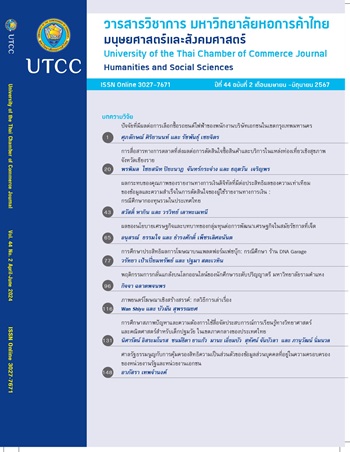The Roles of the Constitutional Court in Protecting the Rights to Privacy of Personal Information Held in Public and Private Agencies
Main Article Content
Abstract
The right to personal information was recognized as a fundamental right in 2017 and was safeguarded by 32 sections of the Thai Constitution. These days, the right to personal information is essential to setting up the work schedule and all section operations. As a result, it's likely that both the state and the private sector may experience a violation of rights to personal information. Since the Constitutional Court is the body tasked with defending the rights of the Thai people, there are very few aspects of the constitution and legislation that are taken into account when a victim brings a case before the court. They no longer play as much of a role in defending the rights to personal information because commercial and state sectors set the rules. Nonetheless, the Constitutional Court is regarded as the key institution that laid the groundwork for safeguarding the rights to personal information. In order to obtain the proper ruling to safeguard Thailand's right to personal information, they will thus apply international standards, such as self-determination of personal information and proportionality, to the inquest.
Article Details

This work is licensed under a Creative Commons Attribution-NonCommercial-NoDerivatives 4.0 International License.
ลิขสิทธิ์ของบทความ
ผลงานที่ได้รับการตีพิมพ์ถือเป็นลิขสิทธิ์ของมหาวิทยาลัยหอการค้าไทย ห้ามมิให้นำเนื้อหา ทัศนะ หรือข้อคิดเห็นใด ๆ ของผลงานไปทำซ้ำ ดัดแปลง หรือเผยแพร่ ไม่ว่าทั้งหมดหรือบางส่วนโดยไม่ได้รับอนุญาตเป็นลายลักษณ์อักษรจากมหาวิทยาลัยหอการค้าไทยก่อน
References
Buengkrai, W. (2000). Disclosure of personal information under the official information Act B.E. 1997 [Master’s thesis]. Chulalongkorn University Intellectual Repository. https://cuir.car.chula.ac.th/bitstream/123456789/71146/1/Weerapong_bu_front_p.pdf [in Thai]
Constitution of the Kingdom of Thailand B.E. 2560. (2017, April 6). Royal Gazette, Volume 134, Section 40 A, pp. 1-90. [in Thai]
Jumpa, M. (2019). Study guide for constitutional law (According to the constitution of the kingdom of Thailand, B.E. 2017). Institute of Legal Education of The Thai Bar. [in Thai]
King Prajadhipok's Institute. (2018). Constitution of the Kingdom of Thailand B.E. 2017 (3rd ed.). Author.
Namart, T. (2008). Right to privacy: Studied of private figure [Master’ thesis]. https://libdoc.dpu.ac.th/thesis/131031.pdf [in Thai]
Nuamthanong, C. (2014). Human rights principles: Human rights and personal data protection. In Training documents: Rule of law for democracy course, class 2 (pp.1-21) [Paper Presentation] Constitution College Office of the Constitutional Court. https://www.constitutionalcourt.or.th/occ_web/ewt_dl_link.php?nid=1362 [in Thai]
Official information Act B.E. 1997. (1997, September 2). [in Thai]
The organic act on procedures of the constitutional court B.E. 2561. (2018, March 2). Royal Gazette, Volume 135, Section 12 A, pp. 1-31. [in Thai]
Personal data protection Act B.E. 2562. (2019, May 27). Royal Gazette, Volume 136, Section 69 A, pp. 52-95. [in Thai]
Secretariat of the Senate. (2017). Constitution of the Kingdom of Thailand, B.E. 2017. https://www.senate.go.th/assets/portals/13/files/รัฐธรรมนูญแห่งราชอาณาจักร%20พุทธศักราช%20๒๕๖๐.pdf [in Thai]
United Nations. (n.d.). Universal declaration of human rights. https://www.un.org/en/
about-us/universal-declaration-of-human-rights
Warren, S. D., & Brandeis, L. D. (1890). The right to privacy. Harvard Law Review, 4(5), 193–220. https://doi.org/10.2307/1321160


